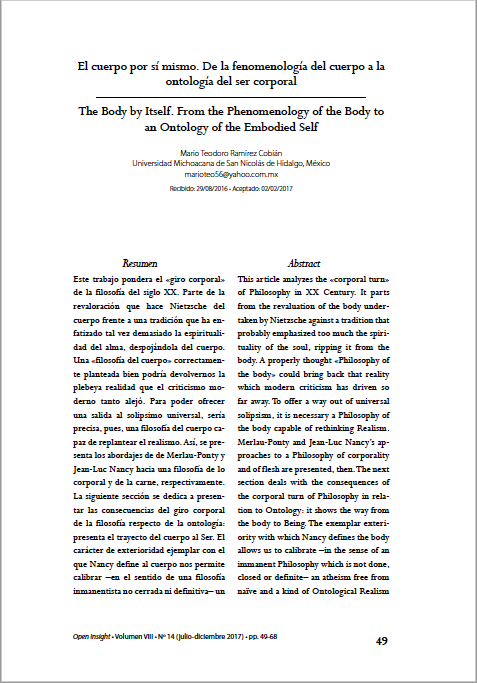The Body by Itself. From the Phenomenology of the Body to an Ontology of the Embodied Self
Abstract
Received: 29/08/2016 • Accepted: 02/02/2017 This article analyzes the «corporal turn» of Philosophy in XX Century. It parts from the revaluation of the body undertaken by Nietzsche against a tradition that probably emphasized too much the spirituality of the soul, ripping it from the body. A properly thought «Philosophy of the body» could bring back that reality which modern criticism has driven so far away. To offer a way out of universal solipsism, it is necessary a Philosophy of the body capable of rethinking Realism. Merlau-Ponty and Jean-Luc Nancy’s approaches to a Philosophy of corporality and of flesh are presented, then. The next section deals with the consequences of the corporal turn of Philosophy in relation to Ontology: it shows the way from the body to Being. The exemplar exteriority with which Nancy defines the body allows us to calibrate –in the sense of an immanent Philosophy which is not done, closed or definite– an atheism free from naïve and a kind of Ontological Realism free from abstractions or dogmatism. To close the cycle, «New Realism» approach, defended by Markus Gabril, Ferraris and Harman, amongst others, is presented and defended. The intention of this article is to present a way in which it is possible to formulate a new Ontology, a new conception of Being and existence, a realistic, materialistic ontology of the corporal being inasmuch the extra-corporal being.References
Deleuze, G. F. Guattari. (1974). El antiedipo. Capitalismo y esquizofrenia. Madrid: Seix-Barral.
Deleuze, G. (2004). Spinoza: filosofía práctica. Madrid: Tusquets.
Ferrais, M. (1999). La hermenéutica. México: Taurus.
Ferraris, M. (2000). Historia de la hermenéutica. Madrid: Akal.
Ferraris, M. (2013). Manifiesto del nuevo realismo. Madrid: Biblioteca nueva.
Foucault, M. (1986-1987) Historia de la sexualidad I. El uso de los placeres, y II. La inquietud de sí. México: Siglo XXI.
Gabriel, M. (2010). “¿Contingencia o necesidad? Schelling y Hegel. Acerca del estatus modal del espacio lógico”. En Ideas y valores, (59) 142: pp. 5-23.
Gabriel, M. (2016). Por qué el mundo no existe. México: Océano.
Graham, H. (2005). Guerrilla Metaphysics. Phenomenology and the carpentry of things. Chicago: Open Court.
Harman, G. (2011). “The Road of Objects”. En Continent (3)1: pp. 171-179.
Harman, G. (2015). Hacia el realismo especulativo. Buenos Aires: Caja negra.
Henry, M. Encarnación. (2001). Una filosofía de la carne, Salamanca: Sígueme.
Husserl, E. (1997). Ideas relativas a una fenomenología pura y una filosofía fenomenológica. Libro segundo: Investigaciones fenomenológicas sobre la constitución. México: UNAM.
Meillassoux, Q. (2015). Después de la finitud. Ensayo sobre la necesidad de la contingencia. Buenos Aires: Caja negra.
Merleau-Ponty, M. (1970). Lo visible y lo invisible. Barcelona: Seix-Barral.
Merleau-Ponty, M. (1974). Fenomenología de la percepción. Barcelona: Península.
Nancy, J. L. (1988). La experiencia de la libertad. Barcelona: Paidós.
Nancy, J. L. (2000). En el cielo y sobre la tierra. Conferencia sobre “Dios” a los niños. Buenos Aires: La Cebra.
Nancy, J. L. (2003a). El sentido del mundo. Buenos Aires: La Marca.
Nancy, J. L. (2003b). Corpus. Madrid: Arena.
Nancy, J. L. (2006). Ser singular plural. Madrid: Arena.
Nancy, J. L. (2007). 58 indicios sobre el cuerpo. Extensión del alma. Buenos Aires: La Cebra.
Nancy, J. L. (2007b). Ego sum. Barcelona: Anthropos.
Nancy, J. L. (2008). La declosión. La deconstrucción del cristianismo I. Buenos Aires: La Cebra.
Ramírez, M. T. (2013). La filosofía del quiasmo. Introducción al pensamiento de Maurice Merleau-Ponty. México: FCE.
Ramírez, M. T, ed. (2016a). El nuevo realismo. La filosofía del siglo XXI. México: Siglo XXI / UMSNH.
Ramírez, M. T. (2016b). El objeto cuádruple. Barcelona: Anhtropos.
Rivera de Rosales, J.; López Sáenz M.C., coord. (2002). El cuerpo. Perspectivas filosóficas. Madrid: UNED.
Sparrow, T. (2014). The End of Phenomenology. Edinburgh: Edinburgh University Press.
Sparrow, T. (2015). Plastic Bodies: Rebuilding Sensation After Phenomenology. Londres: Open Humanities Press.
Villoro, L. (1965). La idea y el ente en la filosofía de Descartes. México: FCE.





